Lessons from the first international Zapatista women’s gathering
From self-governance to soccer tournaments, Zapatista women show how another world is possible at the first international gathering of women in struggle.
“We want to grow older and be able to say that we have been alive for many years and that each year was a year of struggle. But in order for that to happen, we have to be alive. That’s why this gathering is for life. And nobody is going to give that to us, sisters and compañeras. Not god, not man, not a political party, not a savior, not a leader, not a female leader, and not a female boss.We have to struggle for life.That’s our lot, sisters and compañeras, and the lot of all women in struggle.” From the Zapatista Women’s Opening Address at the First International Gathering of Politics, Art, Sport, and Culture for Women in Struggle.
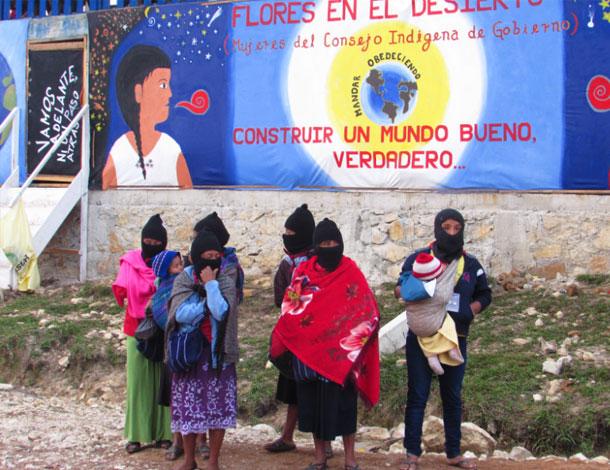
In 1992, a 12 year civil war ended in El Salvador, where my family lives. I was two years old.
My childhood was shaped by the immediate aftermath of that war - for Indigenous people like us, an extension of 500 years of resistance to invasion and expropriation of our lands. In 2004, I was one of thousands of Salvadorans who filled the streets to protest the Central American Free Trade Agreement, and the ongoing economic imperialism of the USA - a key driver in the earlier civil war. I first heard about the Zapatistas and their declaration of autonomy from Mexico on the streets of El Salvador, 10 years after they took over seven municipalities in the city of Chiapas, Mexico.
From their Revolutionary Women's Law, to their autonomous governing structures like ‘caracoles’ (intentionally slow-moving communities inspired by the conch or snail from their Mayan heritage), Juntas de Buen Gobierno (representative councils with rotating members), and innovative mechanisms for reparative justice, I’ve learned about the other world they are building. It’s a world where the people command and the government obeys, where those elected propose and don’t impose, where many worlds fit together. So when the Zapatista women sent out a communiqué on 29 December 2017 inviting women of the world to gather in the Chiapan mountains, I knew that this was the opportunity I had been waiting for.
“If you are a woman in struggle who is against what is being done to us as women; if you are not scared (or you are, but you control your fear), then we invite you to gather with us, to speak to us and listen to us as the women we are.” - Invitation to the First International Gathering of Politics, Art, Sport, and Culture for Women in Struggle in the Zapatista Caracol of the Tzotz Choj Zone
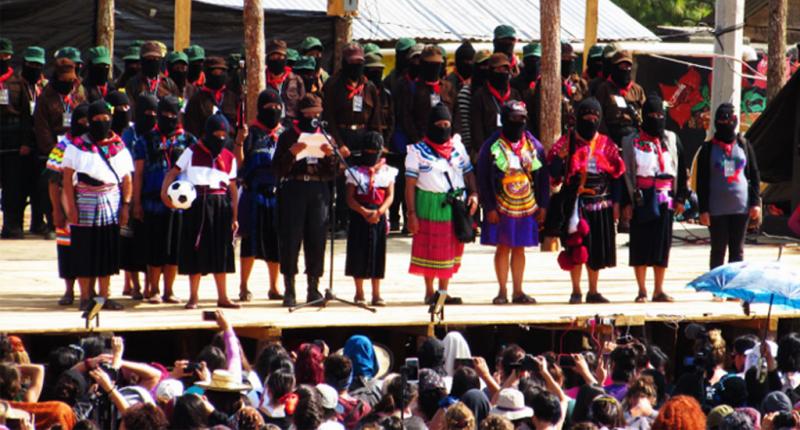
With no idea of how I would get to the Caracol Morelia, I jumped on a bus for 21 hours, crossed two national borders and finally arrived in San Cristobal de Las Casas at 5am.
The next day I met with 12 other women who had travelled from different parts of Mexico, South America and Spain to make our journey together. I did not know much about them except that we were all women involved in movement struggles. None of us really knew where were heading - there was no official website or address, all we had was a google form we had filled out some weeks back. Around 6,000 of us made this same journey, trusting what we did not know. Departing from our own worlds, ways and times we came together to share our struggles, our pains, to know one another.
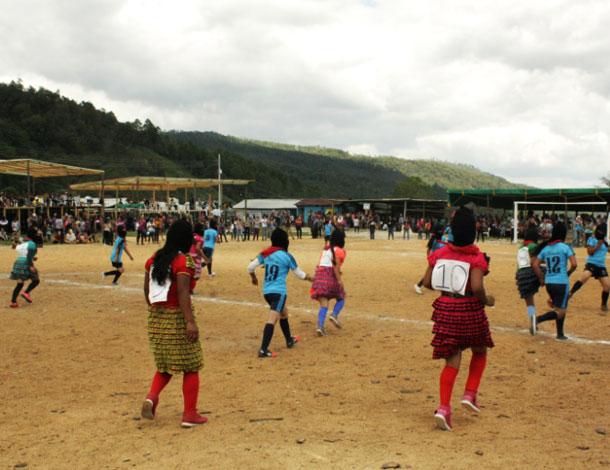
In the middle of the Chiapan jungle we built a world within which many worlds fit.
The first day of the Encuentro was 8 March 8th.
Around 2000 Zapatistas women came from all five caracoles to meet us, to see us, to hear about our dreams and our struggles. Each of them bore the mission to share what they had seen and heard with those who had not been able to come to this first Encuentro. Had it been possible, they said, more would have come. Our day began with a serenade in which five Zapatista women took the stage and called us to rise and join them. One by one we went forward, dancing to their corridos (a Mexican narrative folk song) that reminded us that we were in Zapatista territory this March 8th, celebrating with thousands of others.
Throughout the day, the Zapatista women held ‘la palabra’ (took the floor). They introduced and explained the idea of ‘Insurgent Erika’, a way that they refer to themselves when speaking about the collective rather than the individual. Representatives of all five caracoles walked on stage, welcoming us to this gathering of women who are all part of the struggle. Our shared agreement: to live, understanding that to live is to struggle, for ourselves and for all those who could not be there.
In the days to follow we held over 200 workshops ranging from art-based interventions to panels on land rights, abortion, Indigenous sovereignty, ancestry, solidarity, self-care, healing, anarchy and more. All workshops were self-organized and led by participants. Parallel to this were tournaments in soccer, basketball and volleyball, in which women from all caracoles played alongside visitors. Running in their traditional clothes and masks, the Zapatistas were a powerful reminder of my teenage self, who like them took to the field, reclaiming space for my body, unafraid and unapologetic.
Indigenous women from North and South of the Americas made their way to the Encuentro to meet our Zapatista sisters, to present gifts and give thanks and honor each other's resilience.
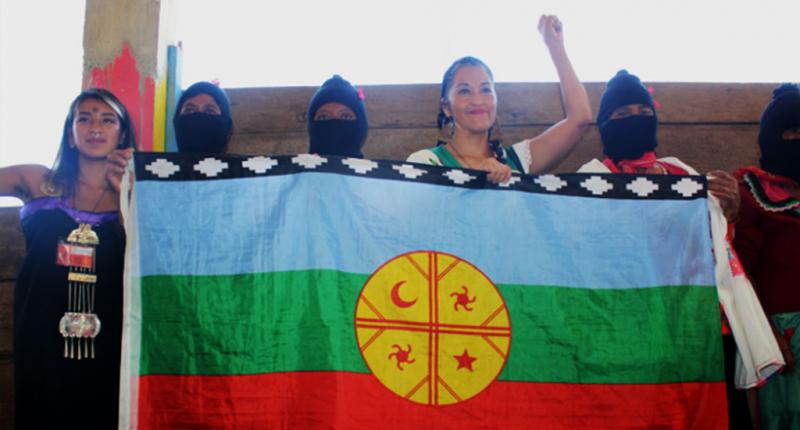
Standing before the Mapuche nation flag, Moira Millán (fourth from left) traveled from Pillan Mahuiza, a community that sits in recovered Mapuche territory of what is today’s Argentina. As she spoke of the ongoing attacks her people and territory are faced with daily, women from across Mexico, Mesoamerica and Turtle Island rose to share their own stories and tactics of resistance. Moira is currently on trial (link in Spanish) for protecting her community’s territory. The resistance of Indigenous women across borders is in many ways the same. The struggles for sovereignty, autonomy, and decolonization have been ongoing.
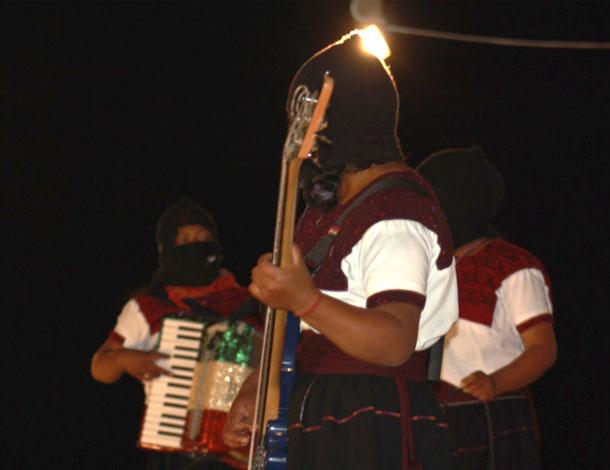
During the day we all wondered across the caracol, moving from one workshop to the other, or finding a patch to sit and continue a conversation.
However, at the end of each day we gathered to dance, sing, and collectively reclaim our bodies and joy. The songs the Zapatistas sang told us about their histories, their lands, and the patriarchal, colonial, capitalist system that no longer governs their territories. In unison we cheered for them and for this other world they have built. For a moment we were held in this world that showed us that the impossible is indeed possible. That within the struggle there is joy. And this joy that carries us through is revolutionary.
With a full heart I returned home, reminded that our struggles are collective, that we are not alone, and that the ways in which this colonial, capitalist, patriarchal world that we live in will be taken down are many. Each of us is needed in the struggle.
The poster below reads “If we join our thoughts and leave our apathies the world is different. Onward women of the world. United against capitalism.” This was the closing message of the gathering.
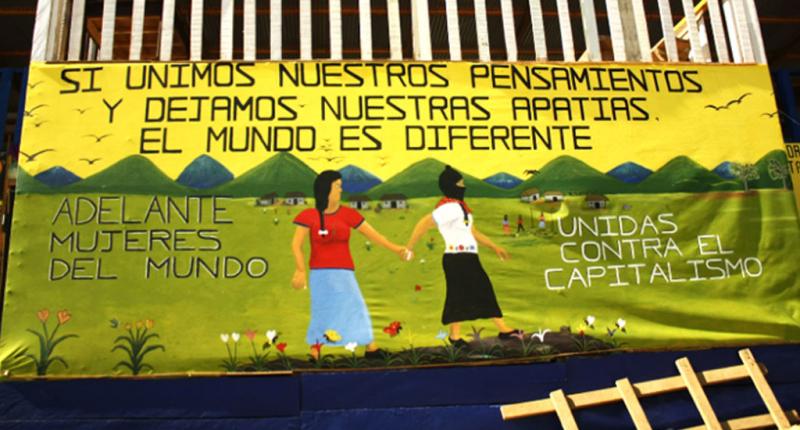
Daniela is a young, queer Salvadoran migrant and feminist with Nonualcan roots based out of El Salvador and Toronto. Daniela works on Advancing Universal Rights and Justice at AWID.
